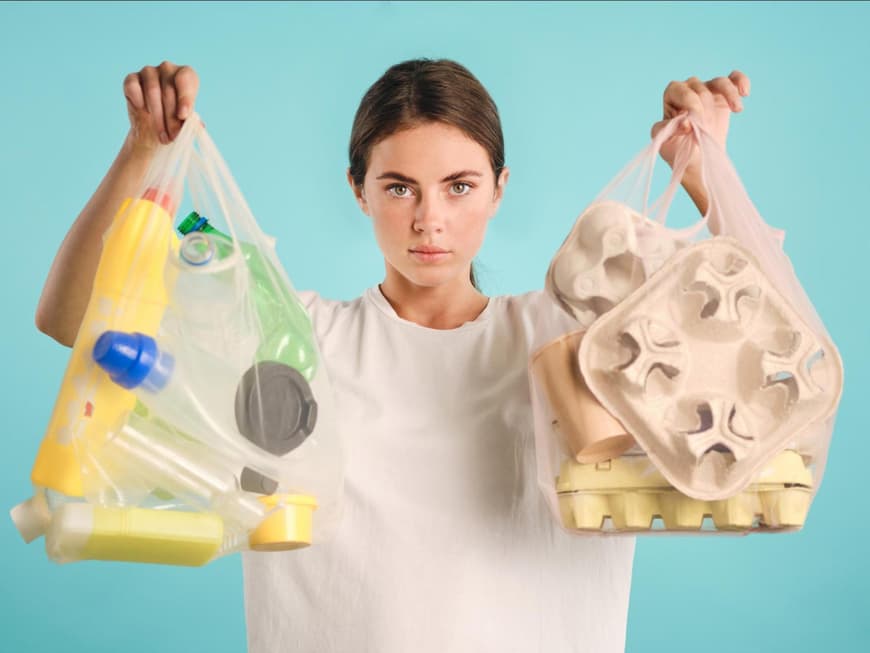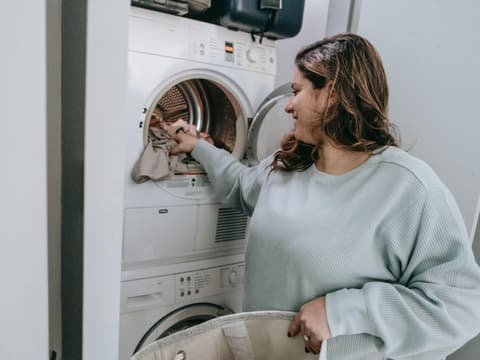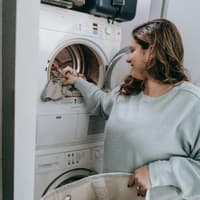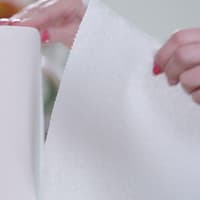
At the moment, almost every topic revolves around environmental protection, CO2, green energy and the like - but it's not just with major measures such as replacing the old heating system or installing a solar system on the roof that you can make an everyday contribution to the environment, but also on a small scale. For example, environmentally friendly alternatives for the household and hygiene products we use every day offer particularly great potential. We show you how you can contribute to environmental protection with very simple everyday measures.
Reducing plastic in everyday life: small decisions with a big impact
Numerous everyday products are still packaged in plastic, often in several layers. From food to clothing and other goods - not to mention single-use plastic containers for cosmetics, cleaning and hygiene products. Although plastic is practical and protects goods from pollution, it poses a problem for ecosystems on land and in the sea, especially in large quantities, which is partly due to the slow decomposition and associated spread of microplastics. You can therefore do the environment a big favor by reducing products with plastic content or packaging in your everyday life and choosing more sustainable alternatives.
More environmentally conscious shopping - sustainable shopping
Wherever possible, replace disposable products with reusable products, e.g. cloth shopping bags instead of plastic bags, or a reusable drinking container instead of taking a new coffee-to-go cup with you every time. Buy regional organic food more often or food from stores and markets without packaging, where you can fill the goods into your own containers.
When it comes to hygiene products, for example, look out for innovative products such as solid shampoos, toothbrushes or cotton buds made from bamboo or cosmetic tissues and make-up remover pads made from sustainable materials. The same applies to sustainable and environmentally friendly cleaning products and cleaning cloths for the entire household.
Sustainable fibers instead of plastics
As many manufacturers now refer to their "green mission", in many places the difference between conventional products and their environmentally friendly alternatives is hardly noticeable at first glance. However, when purchasing paper products such as sanitary and toilet paper, for example, it is now possible to choose alternatives made from sustainable materials with alternative fibers. It is particularly easy to replace different types of paper such as toilet paper, facial tissues, handkerchiefs and cleaning tissues. Instead of normal paper, products made from bamboo, straw, recycled paper or unbleached cellulose can be used. Modern clothing is also increasingly being made from environmentally friendly fibers, with cotton and linen in vogue. There are also alternatives for leather and silk that cause less animal suffering.
Alternative materials: innovations for the environment
However, buying products made from these new materials offers a whole range of advantages. The most important is sustainability, because bamboo, straw, recycled paper and unbleached cellulose come from natural resources and can be both quickly regrown and easily recycled.
Plastics initially consume fossil raw materials and require a lot of energy at every stage of production. At the end of its life cycle, it ends up in a landfill or waste incineration plant, where it again generates costs, consumes energy and pollutes the environment - whereas sustainable natural materials are compostable or recyclable.
Chemicals are also used in the production of paper and pulp, depending on the process. However, environmentally conscious companies can also opt for mechanical processing or the processing of waste paper instead of the chemical processing of virgin fibers. In addition, environmentally conscious suppliers also pay attention to reducing water and air emissions and minimizing energy consumption.
New packaging concepts and environmentally friendly materials In the age of "greenwashing", i.e. the feigned environmental friendliness of numerous manufacturers, it is now up to consumers to separate the proverbial wheat from the chaff, Since 2021, the environmentally conscious oecolife brand of Fripa from Miltenberg in Bavaria has been setting a good example.
Fripa has been a traditional company for decades, but is now one of the most progressive manufacturers of tissue paper in Germany. With alternative products that are also available in stationary retail, the brand is setting a sustainable example for the environment through innovative raw material and packaging concepts. The brand even recently won the Red Dot Award for the kraft paper bags used for its toilet paper.
But they don't just refer to paper products: Cleaning products are available as tabs in paper packaging, while the cleaning stone comes in a jar. The environmentally friendly cleaning agents in tab form (glass cleaner, bathroom cleaner, kitchen cleaner) can be dissolved in water and are ready for use after just a few minutes. Together with the use of glass spray bottles, there is hardly any waste.
Reducing single-use packaging and plastic when doing your weekly shop - and opting for easily available, environmentally friendly alternatives instead - is not a problem that requires a lot of effort these days. By making conscious decisions, you can also make a big impact in your everyday life.







